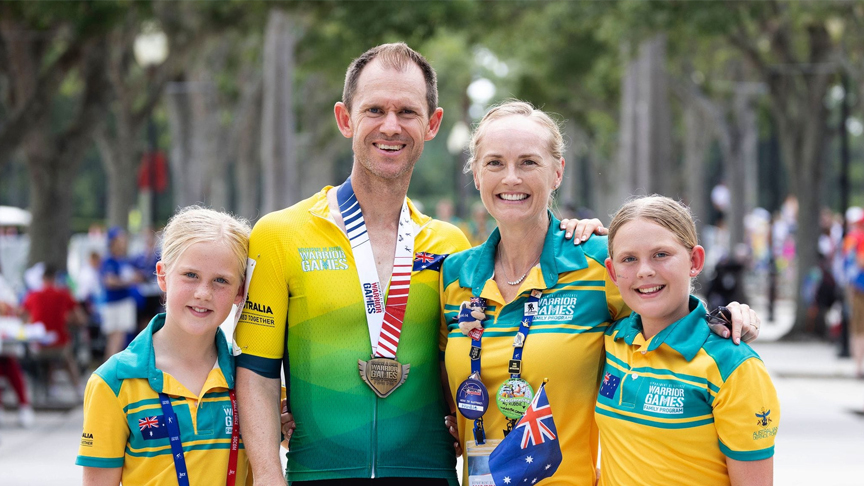
A Sunshine Coast stroke survivor who recently won gold at the Warrior Games has shared his inspiring story of recovery as part of National Stroke Week, to acknowledge the health workers who played a part in his rehabilitation journey and inspire other patients.
In March 2020 father of two Adam Jackson suffered a serious stroke which left him completely paralysed on the right side of his body.
“I was looking at the washing machine thinking all I need to do is pick myself up and I just couldn’t, and I couldn’t find my right arm and I thought that’s weird,” he said.
His wife Kate called 000, and Adam was rushed to a Brisbane hospital.
“When I got to Brisbane, they told me then I wouldn’t be able to walk and if I do walk it’s going to be funny, and I definitely won’t be able to run again,” he said.
“I was just concentrating on surviving at that stage because I had some moments, I suppose you could say in hospital where I felt pretty bad.”
A week later Adam was transferred to Sunshine Coast University Hospital, where he was determined to talk, walk, eat and drink again on his own.
“Even saying my daughters’ names, that took me weeks because there was just that confusion – even now I’ll think yes to an answer and I’ll say no,” he said.
Within two months Adam was not just walking but trying to run. A credit to his incredible mindset, his family support and his health team.
“Adam and I are eternally grateful to every staff member who has helped him throughout his stroke journey including ambulance officers, doctors, nurses, allied health professionals, administration staff, social workers, PSA's and volunteers,” his wife Kate said.
Four years on, Adam still has a non-functional right hand but continues with his rehabilitation and continues to hit goals. The former Army avionics technician competed at the US Department of Defence’s Warrior Games in Florida in June, coming away with one gold, three silver, and one bronze medal.
“It’s just amazing. In my respect – you don’t think you can play sport, or you can’t do these things anymore, and you go to these camps, and they go well actually you can do this sport, or you can do this,” he said.
“It doesn’t matter whether you have legs, or I can’t use my arm, everyone’s there just playing and combining to create this fun team.”
Adam has just been to the selection camp for the first winter Invictus Games being held in Canada in February 2025. Both the Warrior and Invictus Games focus on how the power of sport can help wounded servicemen and women in their recovery.
He is passionate about inspiring others to push further, especially patients who have suffered a stroke.
“The biggest message is don’t give up and don’t take doctors on their face value you have to look inside yourself and go I want to do this, I want to get better,” he said.
“For me my hand is still not functional after nearly four and a half years, but it is what it is, you’ve just got to try and find the positives in your life. I’ve got my wife and my two girls that have been there.
“I remember at the start when I was here, they would wheel me down and we’d play handball out here (at SCUH) just to brighten their day and just to have a bit of fun. It’s about putting yourself out there and trying to make the most of a bad situation.”
National Stroke Week 2024 encourages the community to know the F.A.S.T. (Face, Arms, Speech and Time) signs of stroke so that they can save a life in the event of a loved one experiencing a stroke.
- Face - Check their face. Has their mouth drooped?
- Arms - Can they lift both arms?
- Speech - Is their speech slurred? Do they understand you?
- Time Is critical. If you see any of these signs call 000 straight away.